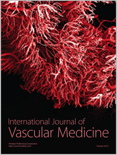
International Journal of Vascular Medicine
Scope & Guideline
Elevating Standards in Cardiovascular Research
Introduction
Aims and Scopes
- Clinical Outcomes in Vascular Treatments:
The journal regularly publishes studies evaluating the long-term clinical outcomes of various vascular treatments, including advanced techniques such as endovenous laser treatment and novel anticoagulants. - Pathophysiology and Risk Factors:
Research often explores the underlying mechanisms and risk factors associated with vascular diseases, such as diabetes-related aortic stiffness and hemorrhagic transformation in ischemic stroke. - Innovative Therapies and Technologies:
The journal emphasizes studies on new therapies and technologies, such as diode lasers for vascular malformations, and the impact of lifestyle choices like aerobic exercise on vascular aging. - Public Health and Epidemiology:
Articles frequently address the public health implications of vascular diseases, including the effects of the COVID-19 pandemic on cardiovascular health and the prevalence of microvascular dysfunction in outpatient settings. - Educational Aspects and Practitioner Knowledge:
The journal also highlights the importance of healthcare practitioners' knowledge regarding conditions such as lymphedema, thereby contributing to improved patient care.
Trending and Emerging
- Impact of Lifestyle Choices on Vascular Health:
Recent publications increasingly investigate how lifestyle factors, such as aerobic exercise and the use of electronic cigarettes, affect vascular health, highlighting a growing interest in preventative measures. - COVID-19 Related Vascular Complications:
There is an evident rise in studies addressing the cardiovascular implications of COVID-19, including myocardial injury and the effects of anticoagulants in patients with COVID-19. - Multicenter and International Studies:
The journal is featuring more multicenter and international studies, which enhance the generalizability of findings and reflect a collaborative approach to understanding vascular diseases. - Novel Anticoagulants and Their Clinical Applications:
Research on novel anticoagulants and their potential benefits, particularly in acute limb ischemia, signifies an emerging trend towards innovative therapeutic strategies. - Microvascular Dysfunction and Its Clinical Significance:
The increasing focus on microvascular dysfunction as a significant clinical risk factor indicates a trend towards understanding more nuanced aspects of vascular health.
Declining or Waning
- Traditional Surgical Techniques:
There has been a noticeable reduction in studies focusing on traditional surgical techniques for vascular interventions, as newer, minimally invasive methods gain prominence. - Basic Science Studies:
Research that primarily focuses on basic science without direct clinical applications appears to be waning, as the journal increasingly favors clinical relevance and translational studies. - Longitudinal Studies on Established Risk Factors:
Longitudinal studies that examine well-established risk factors for vascular diseases are becoming less common, with a shift towards more innovative and less explored risk factors.
Similar Journals

IJC Heart & Vasculature
Pioneering Insights for Heart Health ExcellenceIJC Heart & Vasculature is a premier open-access journal published by Elsevier Ireland Ltd, dedicated to advancing research in the fields of cardiology and cardiovascular medicine. Since its inception in 2013, this journal has established itself as a valuable resource for clinicians, researchers, and students keen on exploring the latest developments in heart and vascular health. With an impressive impact factor and ranked within Q2 in its category (2023), IJC Heart & Vasculature has achieved a significant Scopus rank of #125 out of 387, placing it in the 67th percentile of cardiology journals. The journal not only emphasizes high-quality research but also promotes innovative studies that can shape clinical practices and improve patient outcomes. Researchers and professionals can access a plethora of peer-reviewed articles, original research, and comprehensive reviews that unravel the complexities of cardiovascular science. With a commitment to fostering open and impactful dialogue in the field, IJC Heart & Vasculature is poised to be an essential platform for knowledge exchange in the evolving landscape of cardiovascular research.

Acta Angiologica
Empowering Research for a Healthier HeartActa Angiologica, published by VIA MEDICA, is an Open Access journal dedicated to the dynamic field of cardiology and cardiovascular medicine. Since its inception in 1995, this esteemed journal has provided a vital platform for the dissemination of cutting-edge research and innovative medical practices, especially pertinent to vascular health. Being indexed in Scopus, it holds a rank of #352 out of 387 in its category for 2023, positioning it in the 9th percentile among contemporaneous journals. The journal's commitment to scholarly excellence and accessibility is underscored by its embrace of open access publishing, allowing researchers, professionals, and students to engage with vital advancements in the field without financial barriers. With a converged timeline from 2005 to 2024, Acta Angiologica continues to play a crucial role in bridging gaps in cardiovascular knowledge, fostering collaboration across disciplines, and advancing the implementation of preventative and therapeutic strategies in vascular medicine. Located in Gdansk, Poland, the journal is poised to make significant contributions to the cardiovascular research landscape.

ANNALS OF VASCULAR SURGERY
Elevating Clinical Practices with Groundbreaking ResearchANNALS OF VASCULAR SURGERY is a premier journal published by Elsevier Science Inc, focusing on the rapidly evolving field of vascular surgery and its related disciplines. With a notable impact factor reflected in its 2023 Q2 rankings in Cardiology and Cardiovascular Medicine, as well as in Medicine and Surgery, this journal stands out as a reputable source for cutting-edge research and clinical practices. Since its inception in 1986, it has aimed to advance knowledge, foster innovation, and enhance surgical techniques through comprehensive reviews, original research articles, and clinical trials. Although not currently adopting an open access model, the journal continues to serve as a crucial repository of information for researchers, clinicians, and students, facilitating the dissemination of clinical and scientific advancements in vascular health. As it converges through the years towards 2024, the ANNALS OF VASCULAR SURGERY is poised to remain a valuable resource for the global medical community.
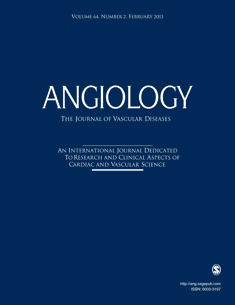
ANGIOLOGY
Fostering Excellence in Cardiovascular ResearchANGIOLOGY is a leading journal dedicated to the field of cardiology and cardiovascular medicine, published by SAGE Publications Inc. With a distinguished history dating back to 1950, this journal serves as an essential platform for the dissemination of cutting-edge research, innovative clinical practices, and emerging trends in cardiovascular health. Holding a respected Q2 ranking in the 2023 Scopus category for Cardiology and Cardiovascular Medicine, and positioned within the 74th percentile of its field, ANGIOLOGY is an invaluable resource for researchers, healthcare professionals, and students alike. While currently not an open-access journal, it offers subscription options to access comprehensive articles that aim to advance knowledge and improve patient care across various cardiovascular disciplines. The journal's commitment to fostering dialogue and sharing groundbreaking findings underscores its importance in the ongoing pursuit of cardiovascular excellence.
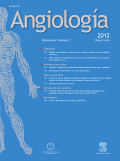
Angiologia
Exploring the depths of cardiovascular medicine since 1949.Angiologia, published by ARAN EDICIONES, S A, serves as a vital platform for the dissemination of research and advancements in the fields of cardiology and cardiovascular medicine. Established in 1949, this Spanish journal has made significant contributions to understanding vascular health, although it currently holds a Q4 status in Scopus rankings, indicating a critical opportunity for emerging researchers to contribute to this evolving field. Spanning from 1949 to 1993 and resuming from 1996 to 2024, the journal reflects a rich history of academic discourse. With its ISSN 0003-3170 and E-ISSN 1695-2987, Angiologia is committed to enhancing the visibility of cardiovascular research, providing access to a diverse range of articles that cater to the needs of healthcare professionals, academics, and students aiming to deepen their understanding of angiological health. While the journal currently does not offer open access options, it remains significant in guiding future research and fostering innovations within the cardiology landscape.
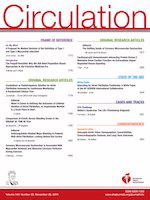
CIRCULATION
Shaping the Future of Cardiology Through Rigorous Research.CIRCULATION is a premier journal in the field of cardiology and cardiovascular medicine, published by Lippincott Williams & Wilkins. With a distinguished history dating back to 1950, the journal has consistently been at the forefront of critical research, showcasing significant advancements and discoveries in cardiovascular health. It holds a remarkable Q1 ranking in both the fields of Cardiology and Physiology (medical) according to the 2023 category quartiles, demonstrating its influential role among the top publications in these disciplines. With an impressive Scopus ranking, placed 3rd out of 387 in Cardiology and 2nd out of 113 in Physiology, CIRCULATION is essential reading for researchers, practitioners, and students passionate about advancing their understanding of heart health and related medical sciences. Although the journal is not open access, it continues to foster scholarly exchange and innovation in cardiovascular research, making it an indispensable resource for quality insights and groundbreaking studies.

Cerebral Circulation-Cognition and Behavior
Bridging Neuroscience with Behavioral InsightsCerebral Circulation-Cognition and Behavior is an impactful journal published by Elsevier that focuses on the intersections of cerebral circulation, cognitive function, and behavioral science. Since its establishment in 2020, the journal has provided a vital platform for researchers and professionals in the fields of Behavioral Neuroscience, Biological Psychiatry, and Cognitive Neuroscience. With a current classification in the Q3 quartile across several neuroscience categories and a promising trajectory during its converged years (2020-2024), the journal highlights significant advancements in our understanding of the neural underpinnings of behavior. Although it is not open access, its commitment to quality research makes it an essential resource for anyone engaged in neurological, cognitive, and psychiatric studies. As discoveries in these fields continue to grow, Cerebral Circulation-Cognition and Behavior remains dedicated to disseminating influential findings that bridge the gap between cognition, behavior, and neural health.
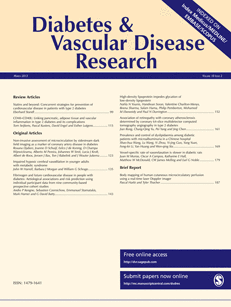
Diabetes & Vascular Disease Research
Advancing knowledge in diabetes and vascular health.Diabetes & Vascular Disease Research is a leading academic journal dedicated to advancing the understanding and treatment of cardiovascular and metabolic diseases, particularly diabetes. Published by SAGE Publications Ltd in the United Kingdom, this journal serves as a key resource for researchers, clinicians, and students seeking to explore the intricate relationship between diabetes and vascular health. With an impressive Impact Factor and ranked in the Q2 quartile in prominent categories such as Cardiology, Endocrinology, and Internal Medicine, the journal provides a platform for high-quality, peer-reviewed research. Covering a broad range of topics from pathophysiology to therapeutic innovations, Diabetes & Vascular Disease Research plays a vital role in shaping contemporary discourse in the field. With contributions from leading experts and a commitment to disseminating valuable findings, this journal is a must-read for anyone involved in the fight against vascular complications arising from diabetes.

EJVES Vascular Forum
Exploring New Frontiers in Vascular SurgeryEJVES Vascular Forum, published by Elsevier, is a premier open access journal focusing on the interdisciplinary field of vascular surgery and cardiovascular medicine. Since its inception in 2001, the journal has provided a vital platform for the dissemination of high-quality research and innovative clinical practices, addressing critical issues in vascular health. With an ISSN of 2666-688X, it has gained recognition within its community, attaining a Q3 quartile ranking in both cardiology and surgery categories as of 2023, and showcasing its relevance and impact within the medical research landscape. Situated in the United Kingdom and accessible globally, the EJVES Vascular Forum invites contributions that foster collaboration and enhance knowledge in vascular surgery, making it an essential resource for researchers, professionals, and students alike. The journal's ranking within Scopus highlights its position among peers, adding further credence to its objectives of advancing science and improving patient care in the cardiovascular realm. By publishing rigorously peer-reviewed articles, the journal aims to be the go-to source of information and innovation for those dedicated to the progress of vascular health.
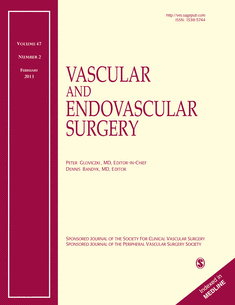
Vascular and Endovascular Surgery
Transforming Patient Care through Vascular InsightsVascular and Endovascular Surgery is a distinguished peer-reviewed journal dedicated to the advancements and innovations in the field of vascular and endovascular medicine. Published by SAGE Publications Inc, this journal serves as a vital platform for clinicians, researchers, and students keen to explore cutting-edge practices, surgical techniques, and emerging therapies within cardiovascular medicine. With an ISSN of 1538-5744 and an E-ISSN of 1938-9116, it has established a solid reputation since its inception, covering articles from its founding years in 1967 to its continuous releases up to 2024. The journal currently holds a Q3 quartile ranking in the categories of Cardiology and Cardiovascular Medicine and Surgery, highlighting its significance within the academic community. Although it is not an open-access journal, it offers valuable content that supports evidence-based practice and clinical decisions in vascular and endovascular procedures. By embracing multidisciplinary collaboration and fostering innovation, Vascular and Endovascular Surgery remains a critical resource for those invested in enhancing patient outcomes and advancing surgical methodologies.